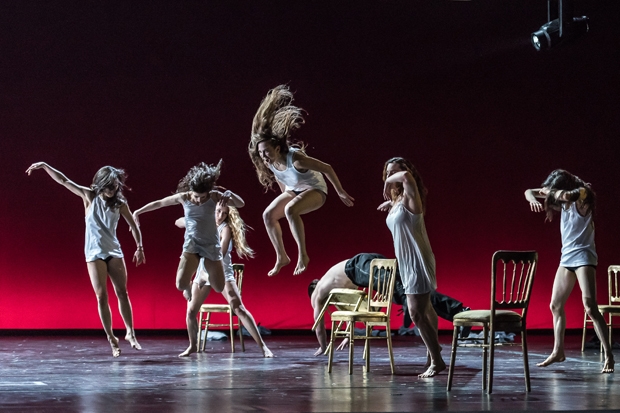Cursed, or perhaps blessed, with almost no visual memory at all, I had almost completely forgotten what the Royal Opera’s current Tannhäuser, directed by Tim Albery and with set designs by Michael Levine, looks like. Or perhaps it was the natural tendency to repress the memory of unpleasant experiences. Wanting to enjoy the Overture, I closed my eyes until the moment the Venusberg ballet that Wagner composed for the doomed Paris version in 1861 began. However many hundreds of times I hear that Overture, with its wind chorale and weary strings, I still hang on every bar.
It was instantly clear that Hartmut Haenchen, the conductor of this first revival, was going to be lighter and fleeter than Semyon Bychkov had been first time round. Mainly, Haenchen’s way is preferable. With Bychkov there were puzzling pauses, dragging orchestral bridge passages, general stasis. Haenchen knocked a quarter of an hour off Bychkov’s timing, with enlivening effect. On the other hand, there was unusually poor ensemble, both from the orchestra, occasionally, and the chorus, whose magnificent grand ensembles in Act II were ragged and their projection poor. You would hardly have guessed that the ensemble in Act II, when Elisabeth rushes to defend Tannhäuser, is the grandest in opera, it was so subdued, no doubt for the benefit of the soloists.
On the other hand, the scandalous Paris Venusberg music was thrilling and shocking — but what was happening onstage? Ballet dancers in singlets did forward and backward rolls, jumped up on to a long dinner table and gyrated, but without a hint of eroticism, hardly any touching, or even teasing. No wonder Tannhäuser didn’t bother to watch it. Only when it reached its long, dying, what should have been post-coital strains did he arrive in his shabby black overcoat, worn throughout, and sit bored on one of the dining-room chairs, which are so prevalent a feature of contemporary opera productions. It was very lowering.
After the far-too-long scene between Venus and our anti-hero — what made Wagner so uncharacteristically prolix? — we surfaced to what Furtwängler, in his great essay ‘The Case of Wagner: freely after Nietzsche’, described as ‘the most refreshing May morning the world has ever seen’ to be greeted with total darkness, except for a dimly illuminated small tree, and the Shepherd Boy. It’s a relief to have that short but lovely song sung by a boy treble, but on the opening night this one was dreadfully out of tune. With the arrival of the hero’s old companions things improved, though of course they are all wearing hand-me-down overcoats. The invigorating close to Act I was all it should be.
It did bring to our attention the wonderful voice and artistry of Christian Gerhaher, who was the star of the first run in 2010. No question about the quality of his singing and some of his acting, but is it the right kind of voice for Wolfram? He treats the notes to so much specific attention that one can’t help feeling this is Fischer-Dieskau returned from the grave. It certainly makes the sharpest contrast with the Tannhäuser of Peter Seiffert, whose approach to his role is lusty and approximate. But it is also amazing that Seiffert, who showed signs of terminal vocal wear and tear 20 years ago, is actually going stronger now, and in this killer role, than he was then. Only rarely did he wobble on top notes, and as always he made the Rome Narration the opera’s emotional climax.
Fighting for his body and soul were two imposing singers. Sophie Koch is a comely artist, but her voice lacks the fruitiness that Venus needs to deal with Wagner’s uninspired music. Emma Bell, by contrast, was the ideal Elisabeth, even more than she was the ideal Elsa. Beautiful to look at, a radiant stage presence, passionate and poignant, she was by far the star of the show. She made one of the most exciting entrances I have seen, and her defence of her wayward lover had all the required power and intensity. This was one of the great Wagnerian assumptions at the Royal Opera in recent years.
Tim Albery’s production is nugatory, casting no kind of illumination on a work that remains puzzling, and gains nothing by being set in an unlocatable war zone, with some of the ugliest settings I have set eyes on. For Tannhäuser still makes one wonder how Wagner could have reduced the urgent issue of different kinds of love, which he investigated with increasing depth throughout his life, to this unhelpful simple-minded conflict between Venus (flesh) and Elisabeth (spirit).
The most intelligent productions push this question hard, with gripping results. Tannhäuser is one of those works that are at least as interesting for their faults as for their virtues, but Albery has been content to let it evade any question and allow the opera to proceed on its attractive musical way.






Comments